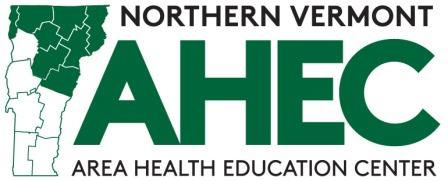Vermont Emergency First Responder (VEFR) Course Overview
Northern Vermont AHEC is pleased to provide a Vermont Emergency First Responder (VEFR) Course for Vermonters. Successful completion of this course qualifies students to affiliate with an ambulance service and become a certified Vermont Emergency First Responder.
What is the VEFR Certification?
The Vermont Emergency First Responder (VEFR) certification is a Vermont-issued workforce credential demonstrating training as a first responder in emergency medical situations. The VEFR certificate supports the EMS workforce in Vermont by introducing Vermonters to the field of emergency medical service. VEFR certification is the minimum credential that qualifies one to work as a volunteer or employee in a fire department or ambulance service in Vermont. The VEFR certification has a scope of practice that includes:
- Administration of cardiopulmonary resuscitation (CPR)
- Use of an Automated External Defibrillator (AED)
- Control of minor and severe bleeding
- Epi-pen administration
- Naloxone administration
While successful completion of this VEFR course provides all the components required for certification, VEFR certification must be obtained through affiliation with a fire department or ambulance service. One must be 16 years old or older to be VEFR certified. The training received through this VEFR course is valid toward certification for 12 months.
How do I achieve VEFR certification?
The VEFR course is comprised of 12 hours of live, online lecture, 8 hours of hands-on skills practice, and 10 hours of online, independent trainings. To fulfill the requirements and be eligible for the VEFR certification, an individual must:
- Attend live, online lectures on February 19-21, 2024 from 5:30 to 8:30 PM.
- Attend an in-person lab session on February 24, 2024 from 8:30 to 4:30 at South Burlington High School.
- Complete four online training modules offered by the Federal Emergency Management Agency (FEMA) and the Vermont Department for Children and Families (VT DCF).
- FEMA IS-100.C: Introduction to the Incident Command System (ICS). This independent study course introduces ICS. It describes the history, features and principles, and organizational structure of the system, and explains the relationship between ICS and NIMS. This is a foundational course for additional trainings on ICS.
- FEMA IS-700.B: An Introduction to the National Incident Management System (NIMS). This course provides training and resources for personnel who require a basic understanding of NIMS.
- FEMA IS-5.A: An Introduction to Hazardous Materials. This independent study course is intended to provide a general introduction to hazardous materials that can serve as a foundation for more specific studies in the future.
- VT DCF Online training for mandated reporters. Learners are introduced to their responsibility under Vermont law, and how to recognize and report suspected child abuse, neglect, and risk of harm.
FAQs
Is there an age requirement? Yes. The state requires that a VEFR candidate be 16 years of age or older to hold a VEFR certification. However, course completion is valid for a year and students who will turn 16 within a year of course completion are eligible to take the course.
Will I be a certified VEFR upon completion of the course? No. When you complete the course, you are eligible to volunteer or seek employment in a local fire department or ambulance service. Once you are affiliated with a department, you can submit your application to the state and they will issue the certification. After you have received your certificate, you will be able to perform duties assigned to you by your department and provide emergency medical care within the scope of practice of a Vermont Emergency First Responder.
I am interested in the course but I don’t know if I can commit to becoming an emergency first responder. Can I still enroll? Yes! Space in this VEFR course is limited and preference will be given to Vermonters who intend to affiliate with an ambulance service upon completion. However, the content of this course is valuable to anyone interested in working in a health-related profession. Course completers will receive separate certifications for Stop The Bleed™ and CPR/AED training, and in the online training modules listed above.

